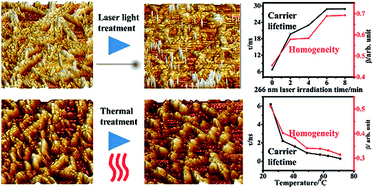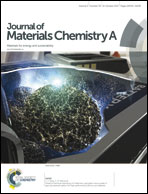Identification of the physical origin behind disorder, heterogeneity, and reconstruction and their correlation with the photoluminescence lifetime in hybrid perovskite thin films†
Abstract
Organolead halide perovskites are an impressive and relatively recent class of light-absorbing materials for solar cells and light-emitting devices. It has been reported that exposure of perovskite materials to light has negative impacts on device performance. Also, surface recombination has been reported as a major obstacle to the total carrier lifetime in perovskite polycrystalline thin films. Herein, we explored the role played by nanosecond pulsed UV laser-irradiation in carrier dynamics in perovskite thin films. Steady-state and time-resolved photoluminescence measurements revealed the interplay of disorder and heterogeneity on photoexcited carrier dynamics, while in situ micro Raman spectroscopy and angle dispersive X-ray diffraction showed the mechanisms of crystal phase reconstruction. Exposure to laser light leads to rapid crystal phase reconstruction and hence, unexpectedly, extends the PL lifetime by fourfold instead of promoting degradation. This verifies that nanosecond pulsed laser irradiation plays a beneficial role in improving optoelectronic material parameters. Our findings reveal that pulsed laser irradiation is a new approach to the reconstruction of the microstructure and offers beneficial effects in the manufacture of perovskite solar cells. Moreover, this work provides a clear insight towards identifying the physical origin behind the disorder, heterogeneity, film reconstruction and nano-structuring as well as their correlation with improved PL lifetimes.



 Please wait while we load your content...
Please wait while we load your content...